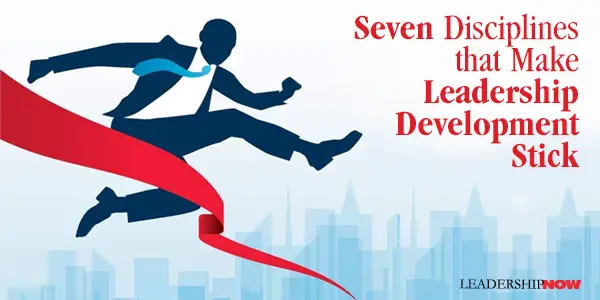 |
 |
06.26.13

Seven Disciplines that Make Leadership Development Stick
LEADERS don't always finish well or finish what they start. Leadership sustainability isn't easy. Given the fact that we all know leaders that haven't finished well, it's surprising how many of us have no plan in place to consciously and specifically improve our leadership abilities. Most of the time we wing it. Leadership sustainability is about the commitment to change and growth that is consistent with shifting requirements, not just individually but for the organization as a whole. In Leadership Sustainability, authors Dave Ulrich and Norm Smallwood have defined seven leadership practices that instill sustainability. It begins with "recognition that what matters most is the impact of the leader's actions on others—not just the actions themselves or the rationale behind them." Yet that's not something that we often feel we have time to consider. Our leadership is experienced in our actions and not our intentions. In brief, the seven disciplines to incorporate into your leadership plan to help make your best intentions stick are: Simplicity. Focus on what matters most. Tells stories with impact. Leadership sustainability requires that we find simplicity in the face of complexity and replace concept clutter with simple resolve. It entails prioritizing on the behaviors that matter most. Time. Manage your calendar to reflect your priorities. Put desired behaviors into your calendar. Employees see what leaders do more than listen to what they say. Leadership sustainability shows up in who we spend time with, what issues we spend time on, where we spend our time, and how we spend our time. Recognize routines and modify as necessary. Accountability. Take personal responsibility for doing what you say you will do and hold others accountable as well. "We see too many leadership points of view that are more rhetorical than resolve, more aspiration than action, and more hopeful than real. Leadership wish lists need to be replaced with leadership vows." Be consistent with personal values and brand. Resources. Leaders dedicate resources in order to support their desired changes with coaching and infrastructure. Use a coach. Get coaching and institutional support to become a better leader. "Leaders acting alone, even with great desire and good intentions, are unlikely to sustain their desired changes." Tracking. Move from general to specific measures. Measure what's important and not what's easy. Tie to consequences. Unless desired leadership behaviors and changes are operationalized, quantified, and tracked, they are nice to do, but not likely to be done. Melioration. Leadership sustainability requires that leaders master the principles of learning: to experiment frequently, to reflect always, to become resilient, to face failure, to not be calloused to success, and to improvise continually. Emotion. Know why you lead. Connect change with personal and organizational values. Recognize your impact on others. Celebrate success. "Some leaders work to hide their feelings and avoid becoming too personal with others. These leaders end up distancing and isolating themselves. Leaders who are emotionally vulnerable and transparent will be more likely to sustain change." The authors have provided videos, tools and assessments on their web site to help you to achieve leadership sustainability.

Posted by Michael McKinney at 11:05 PM
|
BUILD YOUR KNOWLEDGE
 

How to Do Your Start-Up Right STRAIGHT TALK FOR START-UPS 
Grow Your Leadership Skills NEW AND UPCOMING LEADERSHIP BOOKS 
Leadership Minute BITE-SIZE CONCEPTS YOU CAN CHEW ON 
Classic Leadership Books BOOKS TO READ BEFORE YOU LEAD |